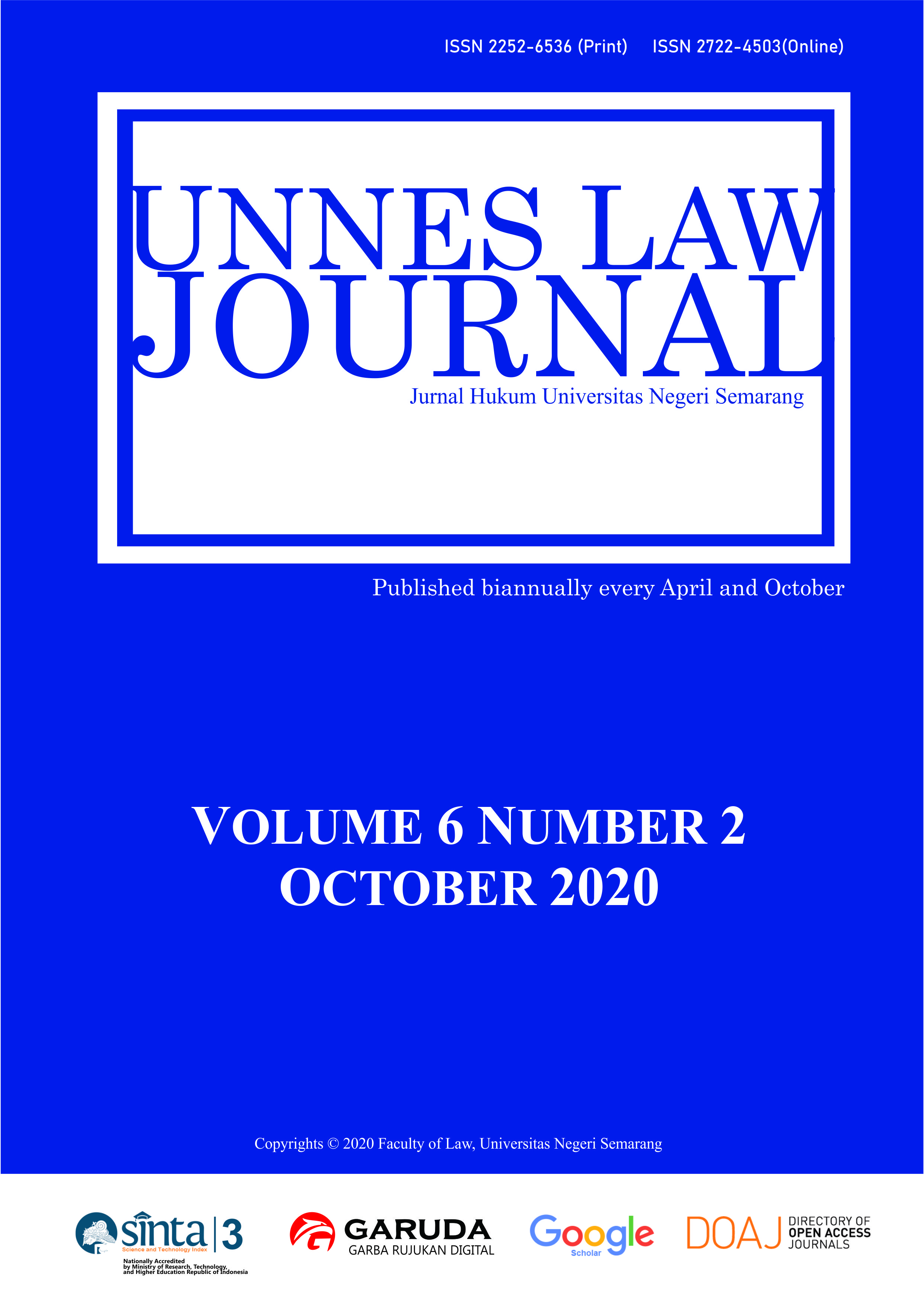The Critical Study of the Omnibus Bill on Job Creation Based on John Rawls View on Justice Legal Studies, Law and Justice
Main Article Content
Abstract
This study aimed to analyze the critical study of The Omnibus Bill On Job Creation based on John Rawls view On Justice. The Government and the House of Representatives ratified the Omnibus Bill on Job Creation through a plenary meeting on October 5, 2020. This is more focused on improving economic growth or investment but does not pay attention to increase the protection and competence of human resources. The type of this research uses normative legal research, legal research that is conducted based on law and regulation, and library material. Related to this type of research, the approach used in this paper is legal, a conceptual approach, and a historical approach. According to the result of research, it can be concluded that the rules of the Omnibus Bill on Job Creation has implications for the imbalance of position between companies and workers and do not provide legal certainty for workers' protection. According to John Rawls, a justice will not sacrifice the rights of some people for the benefits enjoyed by others. Based on the opinion of John Rawls, we can know that if we sacrifice the rights of others for profit is not right. The cooperation based on a work agreement should be of benefit to all parties. These are benefits that can provide welfare to one another. Companies do not need to pay as high as company directors, but companies must be transparent about finances.
Article Details
References
Arifin R., & Lestari, L.E. (2019). Penegakan dan Perlindungan Hak Asasi Manusia di Indonesia dalam Konteks Implementasi Sila Kemanusiaan yang Adil dan Beradab. Jurnal Komunikasi Hukum (JKH), 5(2), 12-25. http://dx.doi.org/10.23887/jkh.v5i2.16497
Asikin, Z. (2007). Dasar-Dasar Hukum Perburuhan. Jakarta: Raja Grafindo.
Bappenas. (2019). “Banyak Aturan Tumpang Tindih, Menteri Suharso Sepakat Omnibus Law sebagai Solusi Indonesia Lepas dari Middle Income Trapâ€, News Online, November 13, 2019, retrieved from https://www.bappenas.go.id/id/berita-dan-siaran-pers/banyak-aturan-tumpang-tindih-menteri-suharso-sepakat-omnibus-law-sebagai-solusi-indonesia-lepas-dari-middle-income-trap/, accessed on 2 October 2020.
Bertens, K. (2000). Pengantar Etika Bisnis. Yogyakarta: Kanisius.
Black, H. C. (1990). Black's Law Dictionary, 6th ed. Paul, MN: West.
Budiono, A. R. (1995). Hukum Perburuhan di Indonesia. Jakarta: RajaGrafindo Persada.
Hernoko, A. Y. (2014). Hukum Perjanjian Asas Proporsionalitas dalam Kontrak Komersial. Jakarta: Prenada Media Grup.
Husni, L. (2014). Pengantar Hukum Ketenagakerjaan Indonesia. Jakarta: Raja Grafindo.
Kusumohamidjojo, B. (2019). Teori Hukum Dilema Antara Hukum dan Kekuasaan, Bandung: Yrama Widya.
Mukaromah, V. F. (2020). “Sederet Fakta Rapat Paripurna Pengesahan Omnibus Law UU Cipta Kerja, dari Interupsi hingga Walk-Out, Kompas, October 20, 2020, retrieved from https://www.kompas.com/tren/read/2020/10/06/144227465/sederet-fakta-rapat-paripurna-pengesahan-omnibus-law-uu-cipta-kerja-dari?page=all, accessed on 5 October 2020.
Notohamidjojo, O. (1971). Masalah Keadilan. Semarang: Tirta Amerta.
Penner, J. (2002). Introduction to Jurisprudence and Legal Theory. London: Butterworhts.
Putra, P. (2020). Penerapan Omnibus Law dalam Upaya Reformasi Regulasi. Jurnal Legislasi Indonesia, 17(1), 1-10. https://e-jurnal.peraturan.go.id/index.php/jli/article/view/602
Rasuanto, B. (2001). Keadilan Sosial: Pandangan Deontologis Rawls Habermas, Dua Teori Filsafat Politik Modern. Jakarta: IKAPI.
Rawls, J. (2001). Teori Keadilan. Yogyakarta: Pustaka Pelajar.
Sudjana, E. (2000). Bayarlah Upah Sebelum Keringatnya Mengering. Jakarta: Persaudaraan Pekerja Muslim Indonesia.
Sumaryono, E. (1995). Etika Profesi Hukum. Yogyakarta: Kanisius.
Sunyoto, D. (2013). Hak dan Kewajiban Bagi Pekerja dan Pengusaha. Yogyakarta: Pustaka Yustisia.
Tillich, P. (2004). Cinta, Kekuasaan, dan Keadilan. Surabaya: Pustaka Eureka.
Toruan, H. D. L. (2017). Pembentukan Regulasi Badan Usaha Dengan Model Omnibus Law. Jurnal Hukum To-Ra, 3(1), 463-472. DOI: https://doi.org/10.33541/tora.v1i1.1092
Tejomurti, K. (2017). Pertanggungjawaban Hukum yang Berkeadilan terhadap Aparatur Pemerintah pada Kasus Pengadaang Barang dan Jasa. Dialogia Iuridica: Jurnal Hukum Bisnis dan Investasi, 8(2), 42-52. DOI: https://doi.org/10.28932/di.v8i2.722
Tejomurti, K., & Kholil, K. (2020, June). Environmental Investment Protection in The Era of Industrial Revolution 4.0. In IOP Conference Series: Earth and Environmental Science, Vol. 519, No. 1, p. 012022). IOP Publishing. DOI: 10.1088/1755-1315/519/1/012022
Ujan, A.A. (1999). Keadilan dan Demokrasi (Telaah Filsafat Politik John Rawls). Yogyakarta: Kanisius.
Wacks, R. (1995). Jurisprudence. London: Blackstone Press Limited.
Wildan, M. (2000). “Pakar Hukum Beri Catatan Khusus soal Omnibus Lawâ€, Article Online, November 4, 2019, retrieved from https://www.pshk.or.id/rr/pakar-hukum-beri-catatan-khusus-soal-omnibus-law/, accessed on 5 October 2020
